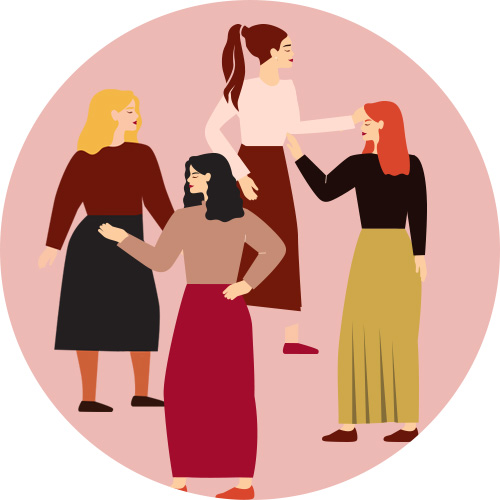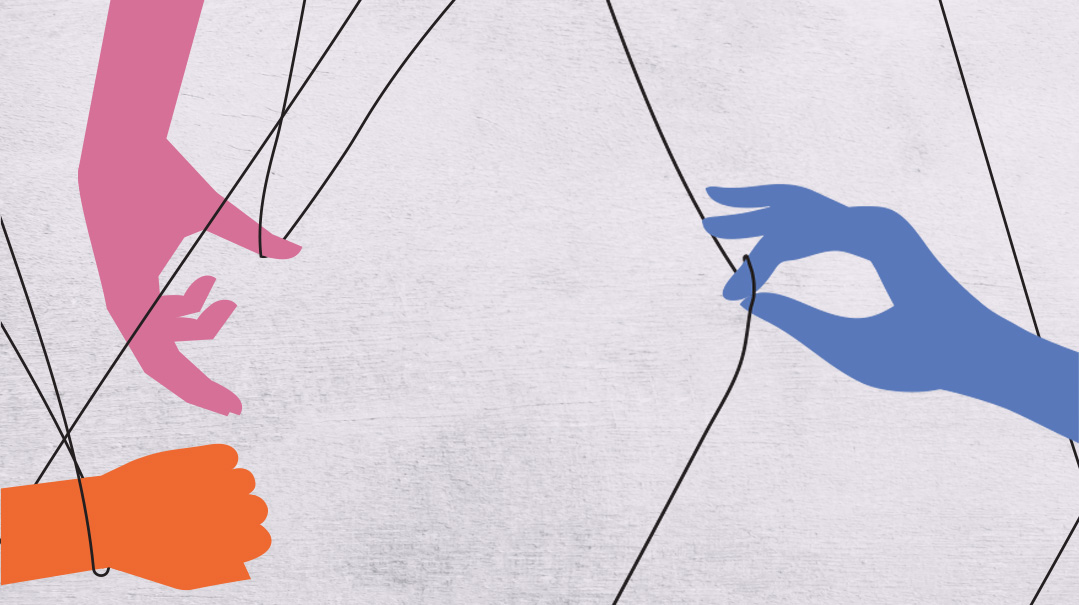Beyond Stand By: Recognizing patterns of problematic behavior
| July 4, 2023It took a while for Dassi to catch on. That’s fine for a fictional character, but here’s what you should know

As a domestic abuse counselor and therapist with over 40 years of experience, I was flooded with comments and concerns while Stand By ran. “Are there really people like this?” some wanted to know. Others recognize characteristics of Ari in their family members.
While it was clear to all that Ari had narcissistic traits, it took a while for Dassi to catch on. That’s fine for a fictional character, but here’s what you should know.
There are few universal red flags. I could list 30 objective “red flags,” but for some women, those behaviors are charming or funny, and they won’t be affected the way others will. For example, a woman may have a large family and not have a lot of quality time with her husband, so she loves to go shopping with him. He sits in frum stores, and she comes out of the dressing room to get his opinion and approval on each dress. Women in the stores whisper: Look at that controlling husband, he doesn’t let her buy anything for herself. But you know what? She loves it!
So if you limit yourself to a checklist of classic red flags, then unfortunately you might miss something that is really wrong for you. How do you know if something is wrong for you? The first thing to do is be honest with yourself about how something makes you feel. If you’re uncomfortable in a situation, and you can’t discuss it with the person who makes you uncomfortable, that’s the biggest red flag. People make mistakes. Sometimes, someone makes you uncomfortable without realizing it; it doesn’t always mean they’re a bad person.
Another thing to look out for is people around you dismissing or minimizing your concerns, urging you to just accept things you are uncomfortable with. These people are doing you a huge disservice. I like to think of it with this example: Imagine you went to a store and picked up a $300 white skirt. You notice a stain on it, which you show the saleswoman. She assures you it will come off. Would you still buy it? No! There’s no guarantee it will get clean, and you’re not spending $300 on a skirt that might have a huge stain. So why are we comfortable doing that in our relationships? You’re right, it may be nothing, and it may get better. But you owe it to yourself to go to a professional or a qualified mentor and investigate so you can recognize what is a normal issue where someone just needs to learn to communicate versus a larger issue.
IN Stand By, Ari pressures Dassi into moving to Israel. He doesn’t leave room for her opinions. In real life, difficult situations do happen. It’s okay for a boy to want to move to Israel even if the girl doesn’t! But they must have a conversation about it. She might express that she’s scared, or whatever is holding her back. You’d want to see him react with empathy, support, and compromise. Maybe he’ll get creative to figure out ways to make it work. He might tell her to factor in regular visits to her family if they can afford it, or maybe he’ll agree to get Internet in the house even if it’s not his first choice, so she could Zoom with her family. Is he hearing her? Or is he telling her that he knows what’s best and she’ll be fine? If you tell someone you’re feeling scared and they tell you you’re not, that’s concerning. No one should belittle your feelings.
Another important thing to remember is stay away from someone who tells you they know you better than you know yourself. Especially in the early stages of dating, when this person has only known you for a few months; no one knows you better than you know yourself. Of course, this is presupposing that you have good self-esteem, and you can listen to your inner self. If not, find mentors or professionals who will help you recover your inner voice and explore what you’re really feeling.
SO to whom should you turn to to discuss your dating life? Hopefully you have a healthy relationship with your parents, and you can speak to them; your parents’ goal is to steer their child in the right direction and be mechanech them properly. In the story, Dassi’s mother’s own experiences influenced her ability to give Dassi objective feedback — she didn’t have an understanding of what was really going on in the relationship. It’s very important to find someone you can trust — whether a parent, rav, therapist, or mentor — who can be objective and is really willing to explore what you’re feeling. You need to talk to someone who can help you get to the core of yourself to help you be honest and figure out what is really going on. No one can tell you, “Don’t worry, everything will be fine,” or even that it won’t be fine. No one has nevuah. You need to figure out what you can live with and what you’re comfortable with without being pressured by other people’s opinions.
When Ari wanted Dassi to change her shoes for their vort — the shoes she’d specifically purchased to match her dress — he expressed that the height issue was making him uncomfortable. It’s not the appropriate time to discuss feelings about their respective heights while they’re walking out the door, especially when she communicated that she had no other options. Obviously, in this story, this was one action in a pattern of concerning behaviors — and that’s what you should look for. Judge the pattern, not the isolated incidents. It’s okay for couples to have personal tastes, and it’s okay to try to please your spouse, but it should come from a place of love, not from a fear of consequences. Also, know that it is okay to disagree. Couples shouldn’t have to feel like they’re being assertive or “fighting” when they’re expressing a dissenting opinion. When engaged couples tell me they never have disagreements, I’m concerned. Not because they need to fight, but they need to express their feelings about things in the relationship. So we encourage couples, even in the relatively short time frame of dating, to express their feelings and opinions, to have healthy discussions and share different views, and see if they can compromise and work things out. If they can’t decide what to do on a date or what restaurant they’re going to, they won’t develop the tools to make bigger decisions in life.
Finally, know that this is not just a girl’s problem. Whether you are male or female, you should never tolerate someone who puts you down, who doesn’t value your opinion, or tells you that you don’t know what you’re talking about. If you feel like you need to walk on eggshells around someone, or they tell you what to do without taking your opinion into consideration, talk to a parent, rav, mentor, or therapist who you trust. It’s always better to err on the side of getting help.
Dassi made the decision that was right for her before it was too late, but if you or someone you know is in a situation where you’re unsure if it’s healthy or not, know this: In healthy relationships, you look for someone who you respect, who is supposed to build you up, who you enjoy being with and spending time with. A spouse is supposed to make you feel good, it should be someone you can trust and want to share things with. It’s someone you want to encourage and be encouraged by, someone you want to come home to at the end of the day. If you’re missing that, go for help as soon as possible. You deserve more. Don’t let anybody question who you are, don’t let anyone get in the way of your self-worth. Find a partner you can reach your highest potential with, and be zocheh to build a bayis ne’eman b’Yisrael.
The author can be reached through Mishpacha.
(Originally featured in Family First, Issue 850)
Oops! We could not locate your form.



